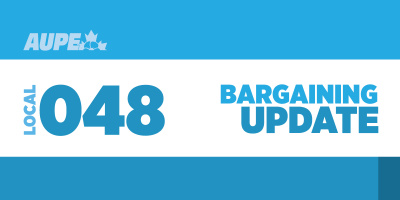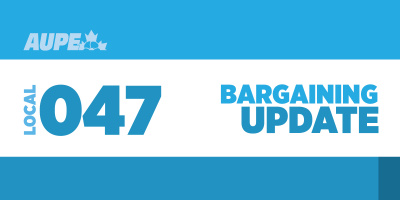LTCs such as CapitalCare and Carewest, two wholly owned subsidiaries of AHS, were always meant to supplement our public healthcare system, not sink it. But if Health Minister Shandro and his crew have their way, they will reduce both to money-making, job-killing, healthcare-destroying machines.
For their vision to come true, AHS would have to follow the recommendation of the UCP-commissioned Ernst & Young report and privatize CapitalCare and Carewest.
Staffing a privatized long-term care (LTC) home demands the same challenging work, with only a fraction of the resources to complete it. Fortunately, AUPE members are organizing to stop AHS from implementing the disastrous privatization plan!
The AHS Implementation Plan Explained
Under the proposed privatization scheme, a corporation would gain control of your worksites, and your new bosses would not be responsible to Albertans anymore. Instead, they’d answer to their rich shareholders. Meanwhile, everyday workers like you – along with the residents you support and all of your neighbours – would still be on the hook for subsidizing the facilities.
Private operators cheat workers
They’ve done it before, and they’ll do it again. There are a number of ways private care companies take advantage of Alberta’s fractured continuing-care system to cheat workers, and they’re likely to try all of these tricks on you and your fellow members at CapitalCare and Carewest’s LTC homes if they get the chance.
You’re probably wondering how a private operator downgrades long-term care. After all, aren’t LTC beds publicly regulated? Don’t they receive the same funding from AHS, regardless of who owns them?
The answer lies in your working conditions.
1. They pick your pockets, then hide the balance sheets
Yes, AHS provides funding for LTC beds in private continuing-care homes that’s equivalent to those in public homes. The problem is, the health authority signs the cheque with few strings attached, and you can bet private care companies go to great lengths to cover their trail and hide financial statements if anyone asks to see the expenditures. But AUPE members aren’t easily fooled. We know that private providers can skim, diverting public funds from the front-lines to their shareholder’s pockets.
They skim by paying you below industry standard. They skim by reducing your benefits and differentials. And in many situations, they skim by simply reducing your hours. They prioritize part-time positions over more stable full-time equivalents (FTEs) and lean on a skeletal staff that ultimately runs workers ragged.
One pre-pandemic benchmark study shows continuing-care residents in private homes receive about one hour less direct care per day than residents at public AHS homes. In other words, when you suffer lost income and stable hours, the residents you care for also suffer.
2. They crush your collective agreement
If AHS sells CapitalCare and Carewest, the new owner will likely try to bust our union and is under no obligation to hire you, forcing you to reapply for your jobs at lower wages and beleaguered benefits. A private contractor won’t want to adopt the “burden” of your hard-earned collective agreement, because your negotiated protections block them from earning an extra buck at workers’ and patients’ expense.
While we have channels through the Alberta Labour Relations Board to challenge these attacks , ALRB decisions don’t always get us the results we need, which is why it’s critical we organize on the ground to prevent the privatization from wreaking the havoc it’s guaranteed to cause.
For one, privatization would cheat you of your defined benefits pension plan as most private providers don’t have pension plans. Thousands of LTC residents would also lose their security and stability. People with complex illnesses rely on consistency of care for their wellbeing, so even a temporary disruption in their routine, from new support staff, new schedules, and even new homes, can cause permanent damage.
3. They erode quality jobs and quality care by hiring sub-contractors
Sub-contracting is a sneaky tactic private operators deploy to save money, and it comes at a cost to frontline AUPE members. Many of you will recall what happened to AUPE continuing-care staff in Vegreville: Once upon a time, their town’s Century Park supportive living facility was publicly owned and operated. But in 2017, Optima Living bought the home, ushering in an aggressive profit-making culture.
Not one year later, the corporate care company decided to abandon its responsibility to residents and sell the jobs of 53 AUPE nursing care and GSS members to a privately held sub-contracting company (Pro Vita). Optima Living issued layoff notices to all 53 workers and then Pro Vita hired new staff at a fraction of the cost, paying them $8-$10 an hour less than our members earned.
4. They double down on General Support Services
Privatization often hits general support services twice because residents pay for these amenities out-of-pocket. Food, laundry, housekeeping: none are subsidized, which makes the hospitality side of the continuing-care industry a windfall for private-sector bosses who jump at the chance to charge LTC residents’ exorbitant fees for basic services.
As you may have already guessed, almost none of the revenues generated from these fees go back into the service itself. The upselling basically amounts to thievery: GSS workers at newly organized continuing-care sites barely break minimum wage, while the CEOs who run the facilities receive over half a million dollars in base salary alone.
The basic rule of privatization follows that the more the operators can drive up service fees and drive down worker wages, the more they can pocket. This is why the Ernst & Young report also recommends even higher resident fees for LTC residents and co-payment drug plans, which together, threaten to make even quality public care unaffordable for some of the most vulnerable Albertans.
Stop the Sell-Off!
Our solidarity will win this battle
After AUPE wrote to AHS in December 2020, the health authority informed AUPE they’re not exploring privatization of CapitalCare and Carewest right now, but that doesn’t mean corporatization is off the table. The best way to fight privatization is to prevent it, as it’s much easier to stop than it is to reverse, so it’s crucial that CapitalCare and Carewest members start mobilizing today.
You’ve already laid the foundation for an impressive fight. When surveyed through textbank in August 2020 by AUPE representatives and asked if you agreed with the province’s privatization plans, you overwhelmingly responded “NO.”
At CapitalCare, 351 – or 99 per cent – of respondents said they oppose the sell-off. At Carewest, 535 – or 97 per cent – of respondents said they oppose the sell-off.
Since the summer, you’ve raised your voices and demanded that the Health Minister stop the proposed sell-off, even launching a letter-writing campaign directed at the UCP. If you haven’t already signed the open letter, add your name today!
We know from experience that when working people band together, they can win against even the biggest bullies. Just last week (Jan. 29) AUPE members celebrated the success of a seven-month long campaign to save multiple homes for persons with developmental disabilities (PDD) from privatization.
Front-line care workers and guardians have been battling the Minister of Community and Social Services Rajan Sawhney ever since she announced the UCP was examining handing over care to private operators, which might have involved moving residents during a pandemic. On Jan. 29, the Minister succumbed to our pressure and announced PDD services will remain public.
AUPE members who ran the campaign used many of the tactics you’re using to keep Alberta’s LTCs public, and they’re an inspiring example of what we can achieve when we work together, with other members and our surrounding communities.
Fighting for optimal care, not standard care
You and your fellow workers have achieved two of the strongest LTC collective agreements in the province. In fact, your working conditions are almost on par with AUPE’s AHS contracts, which set the standard for working conditions in the industry.
But like your fellow members at AHS, you know “standard care” is not good enough, which is why you’ve always committed yourself to the fight for optimal care. There’s still much to be desired in Alberta’s public long-term care system, and we won’t allow AHS to pull us from this battle by dragging us into the private sector, where employers expect us to fight for crumbs.
Let’s stop the sell-off, so we can focus our energy where it counts – so we can continue to protect public LTC residents from other disgusting attacks proposed in the Ernst & Young report that threaten to make quality care completely unaffordable for some of the most vulnerable Albertans.


